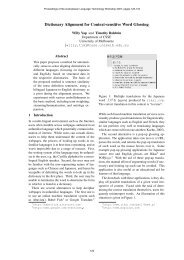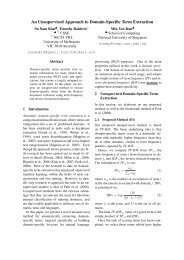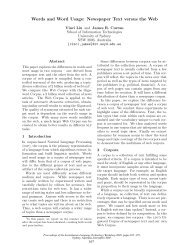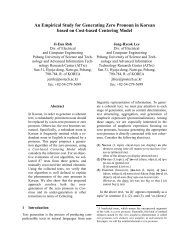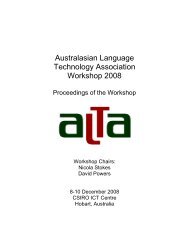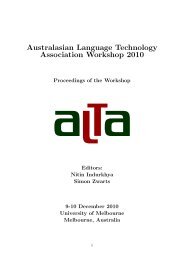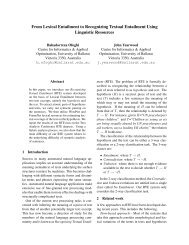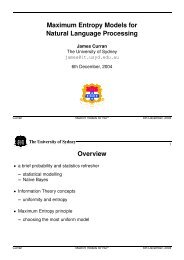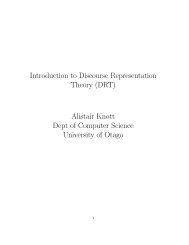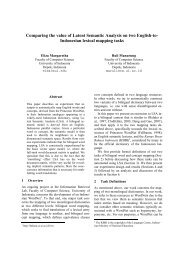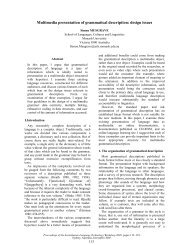Full proceedings volume - Australasian Language Technology ...
Full proceedings volume - Australasian Language Technology ...
Full proceedings volume - Australasian Language Technology ...
Create successful ePaper yourself
Turn your PDF publications into a flip-book with our unique Google optimized e-Paper software.
Question<br />
Which word is closest in meaning (most related) to<br />
startle?<br />
How positive (good, praising) is the word startle?<br />
How negative (bad, criticizing) is the word startle?<br />
How much is startle associated with the emotion<br />
{joy,sadness,. . . }?<br />
Possible answers<br />
{automobile, shake, honesty, entertain}<br />
startle is {not, weakly, moderately, strongly} positive<br />
startle is {not, weakly, moderately, strongly} negative<br />
startle is {not, weakly, moderately, strongly} associated<br />
with {joy,sadness,. . . }<br />
Table 1: Sample annotation question posed to Mechanical Turk workers by Mohammad and Turney (forthcoming).<br />
We selected two sentences for each word pair<br />
from the SCALE 1.0 corpus. Sentences were initially<br />
selected by a random number generator:<br />
each sentence originally contained the more negative<br />
word. Since we are constructing an idealised<br />
system here, evaluating the possibility of<br />
valence shifting by changing a single word, we<br />
manually eliminated sentences where the part of<br />
speech didn’t match the intended part of speech of<br />
the word pair, where the word was part of a proper<br />
name (usually a movie title) and where the fluency<br />
of the resulting sentence otherwise appeared terribly<br />
bad to us. Where a sentence was rejected<br />
another sentence was randomly chosen to take its<br />
place until each word pair had two accepted sentences<br />
for a total of 40 sentences. We then made<br />
changes to capitalisation where necessary for clarity<br />
(for example, capitalising movie titles, as the<br />
corpus is normalised to lower case).<br />
Since each subject is being presented with multiple<br />
sentences (40 in this experiment), rather than<br />
coming to the task untrained, it is possible that<br />
there are ordering effects between sentences, in<br />
which a subject’s answers to previous questions<br />
influence their answers to following questions.<br />
Therefore we used a Latin square design to ensure<br />
that the order of presentation was not the same<br />
across subjects, but rather varied in a systematic<br />
way to eliminate the possibility of multiple subjects<br />
seeing questions in the same order. In addition,<br />
the square is balanced, so that there is no<br />
cyclical ordering effect (i.e. if one row of a Latin<br />
square is A-B-C and the next B-C-A, there is still<br />
an undesirable effect where C is tending to follow<br />
B). The presentation word order to subjects was<br />
also randomised at the time of generating each<br />
subject’s questions.<br />
3.2 Elicitation of judgements<br />
Having constructed the set of test sentences (Section<br />
3.1), we ask human subjects to analyse the<br />
sentences on two axes: ACCEPTABILITY and<br />
NEGATIVITY. This is loosely equivalent to the<br />
FLUENCY and FIDELITY axes that are used to<br />
evaluate machine translation (Jurafsky and Martin,<br />
2009). As in the case of machine translation, a<br />
valence-shifted sentence needs to be fluent, that is<br />
to be a sentence that is acceptable in its grammar,<br />
semantics and so on, to listeners or readers. While<br />
some notion of fidelity to the original is also important<br />
in valence shifting, it is rather difficult to<br />
capture without knowing the intent of the valence<br />
shifting, since unlike in translation a part of the<br />
meaning is being deliberately altered. We therefore<br />
confine ourselves in this work to confirming<br />
that the valence shifting did in fact take place, by<br />
asking subjects to rate sentences.<br />
In order to obtain a clear answer, we specifically<br />
evaluate valence shifting with sentences as<br />
close to ideal as possible, choosing words we<br />
strongly believe to have large valence differences,<br />
and manually selecting sentences where the subjects’<br />
assessment of the valence of these words<br />
is unlikely to be led astray by very poor substitutions<br />
such as replacing part of a proper name. (For<br />
example, consider the band name Panic! at the<br />
Disco: asking whether an otherwise identical sentence<br />
about a band named Concern! at the Disco<br />
is less negative is unlikely to get a good evaluation<br />
of lexical valence shifting.) We then ask human<br />
subjects to evaluate these pairs of sentences<br />
for their relative fluency and negativity.<br />
Mechanical Turk Our subjects were recruited<br />
through Amazon Mechanical Turk. 2 Mechanical<br />
Turk is a web service providing cheap de-<br />
2 http://www.mturk.com/<br />
45



